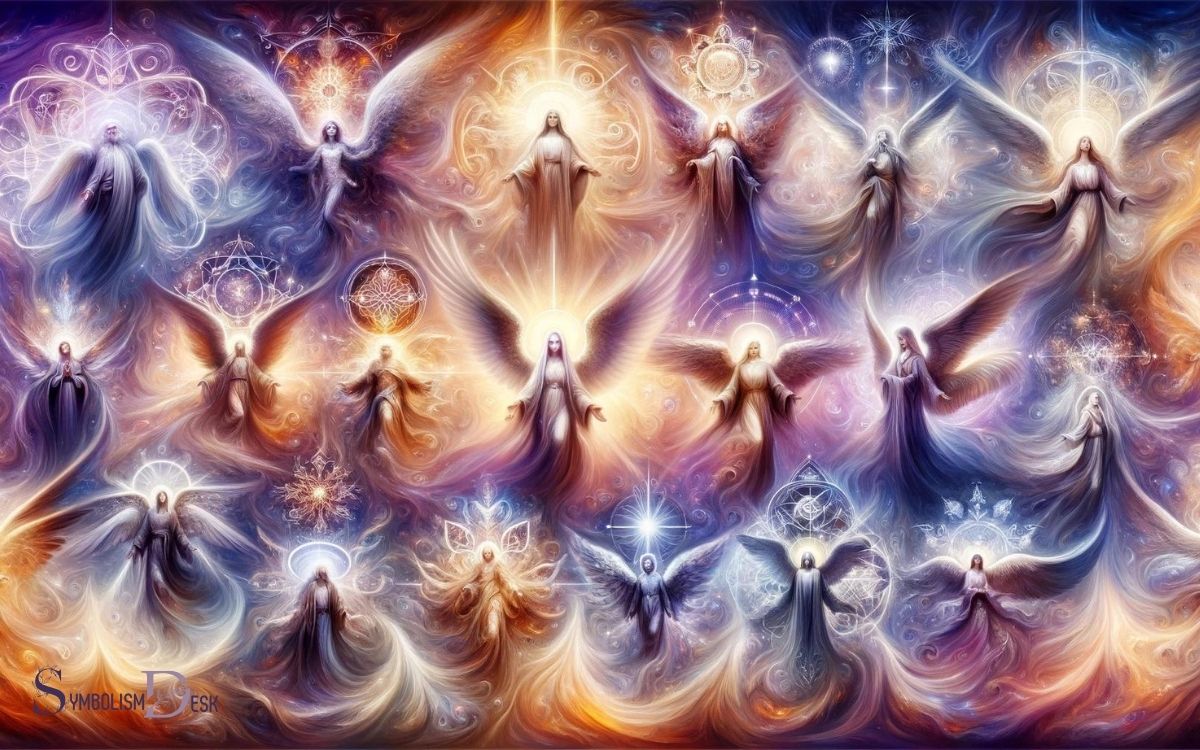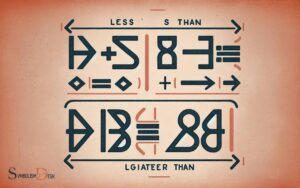Angel Names and Meanings and Symbols: Hope!
Angel names, their meanings, and associated symbols constitute a compelling subject within spiritual and cultural studies. These names are often rooted in ancient texts and carry significant spiritual implications.
They represent messages of hope, guidance, and protection. By delving into the etymology and iconography of angelic beings, one can unpack the layers of symbolic meaning that have been ascribed to these celestial figures across different cultures and religions.
The significance of angel names extends beyond their linguistic origins to encompass a variety of symbols that convey their roles and attributes.
For example:
These names and symbols are derived from a range of sources, including biblical texts, apocryphal writings, and the broader lore of angelology.
Unraveling the meanings behind angel names enriches our understanding of spirituality and divine guidance.

Key Takeaway
Comprehensive List of Angel Names, Meanings, and Symbols
| Angel Name | Meaning | Symbol |
|---|---|---|
| Michael | “Who is like God?” | Sword, Shield |
| Gabriel | “God is my strength” | Trumpet, Lily |
| Raphael | “God has healed” | Staff, Fish, Healing Ointment |
| Uriel | “God is my light” | Flame, Sun |
| Selaphiel | “Prayer of God” | Eyes downward, Hands crossed |
| Jegudiel | “Glorifier of God” | Crown, Whip |
| Barachiel | “Blessing of God” | Basket of Bread, Flowers, Clover |
| Saraqael | “Command of God” | Incense |
| Remiel | “Mercy of God” | Tears, Olive Branch |
Origins of Angelic Names
The origins of angelic names can be traced back to various religious and cultural traditions, each imbuing the names with specific meanings and significance.
- In Christianity, angel names often reflect the attributes or roles of the angels, such as Gabriel, which means “God is my strength,” or Michael, meaning “Who is like God?”
- In Islam, the names of angels like Jibril (Gabriel) and Mikail (Michael) also hold deep religious significance.
- In Judaism, angelic names like Raphael, meaning “God has healed,” are derived from Hebrew, reflecting the language and cultural context of the faith.
Meanwhile, in other cultural traditions, such as ancient Mesopotamia and Greece, angelic names were often linked to specific deities or divine beings, illustrating the diversity and richness of angelic name origins across different cultures and belief systems.
Symbolism in Angelic Names
The symbolism inherent in angelic names offers a fascinating look into the deeper meanings and divine significance behind these names.
By exploring the hidden meanings within these names, we can gain insight into the celestial realm and the attributes associated with different angels.
Understanding the symbolism in celestial names allows for a deeper appreciation of the spiritual and mystical aspects of these beings.
Names as Divine Symbols
Angelic names serve as powerful divine symbols, reflecting the essence and attributes of the angels they represent.
These names are not merely labels but imbued with deep significance, often conveying messages and meanings that transcend language and culture.
The symbolism in angelic names can be profound, offering insights into the nature of these celestial beings and their roles in the spiritual realm.
Through the study of these names, individuals can gain a deeper understanding of the divine and draw strength and inspiration from the symbolism they embody.
- Angelic names carry ancient wisdom and spiritual insights.
- The symbolism in these names transcends cultural and linguistic boundaries.
- Understanding the meanings of angelic names can provide profound spiritual insights.
- These names serve as powerful reminders of the divine attributes and qualities they represent.
Angelic Names’ Hidden Meanings
An understanding of the hidden meanings and symbolism within angelic names provides profound insights into the celestial realm and its divine inhabitants. Angelic names often carry symbolic meanings that reflect the angel’s attributes, roles, or the divine messages they bring.
Here is a table that showcases some common angelic names and their hidden meanings:
| Angelic Name | Hidden Meaning |
|---|---|
| Gabriel | “God is my strength” |
| Michael | “Who is like God?” |
| Raphael | “God heals” |
| Uriel | “God is my light” |
| Ariel | “Lion of God” |
| Azrael | “Angel of Death” |
Symbolism in Celestial Names
Symbolism is embedded within celestial names, illuminating the divine attributes and messages associated with these angelic beings.
The symbolism in angelic names conveys profound meanings and insights, including:
- Guardianship: Many angelic names symbolize the role of guardianship, signifying protection, guidance, and support.
- Virtue and Purity: Certain celestial names symbolize virtues such as purity, righteousness, and moral integrity, reflecting the angel’s divine nature.
- Messenger of Divine Will: Some angelic names symbolize their function as messengers of divine will, carrying important revelations and guidance to humanity.
- Healing and Comfort: Other celestial names symbolize healing and comfort, embodying the nurturing and compassionate nature of these angelic beings.
Understanding the symbolism in celestial names deepens our appreciation for the significance and purpose of these angelic entities, shedding light on their roles in the spiritual realm.
Meaning Behind Angelic Symbols
What are the meanings behind the angelic symbols commonly used in religious and spiritual contexts? Angelic symbols often carry deep spiritual significance, representing various attributes and qualities associated with angels.
Here is a table depicting some common angelic symbols and their meanings:
| Symbol | Meaning |
|---|---|
| Wings | Divine protection and freedom |
| Halo | Illumination and enlightenment |
| Harp | Harmony and the divine music |
| Sword | Protection and divine authority |
| Star | Guidance and divine presence |
These symbols serve as visual reminders of the divine qualities that angels embody and the spiritual messages they bring.
Understanding the meanings behind these symbols can deepen one’s connection to the angelic realm and enhance their spiritual practice.
Cultural Variations in Angel Names
The exploration of cultural variations in angel names provides insight into the diversity of spiritual beliefs and practices across different societies.
Angelic beings are revered in various cultures, and their names often reflect the unique linguistic and religious traditions of different regions.
Cultural variations in angel names can be observed through:
- Linguistic Diversity: Angel names vary across different languages, reflecting the phonetics and grammatical structures of each language.
- Religious Significance: The meanings and interpretations of angel names differ based on the religious context and beliefs of the culture.
- Historical Influences: Angel names may be influenced by historical events, folklore, and the evolution of religious practices in specific cultures.
- Symbolism: Different cultures attribute specific symbols and attributes to angels, which are reflected in their names and the meanings associated with them.
Angel Names in Religious Texts
Many religious texts feature a multitude of angel names, each with significant roles and attributes within the context of their respective beliefs.
- In Christianity, the archangels Michael, Gabriel, Raphael, and Uriel are mentioned in various biblical texts, each carrying out specific duties such as protection, communication, healing, and guidance.
- In Islam, the archangel Jibril (Gabriel) is revered for delivering messages from Allah to prophets, including the Quran to Muhammad.
- Judaism also mentions archangels such as Michael and Raphael, each associated with protection and healing.
- In Sikhism, angels known as “devas” are considered servants of God and are associated with various aspects of creation.
Hinduism features numerous celestial beings, such as Devas and Asuras, who are often depicted in stories and scriptures as powerful and influential entities.
The diverse angelic figures across religious texts reflect the importance of divine messengers and guardians within different belief systems.
Modern Interpretations of Angelic Symbols
Continuing from the previous subtopic, a significant number of modern interpretations of angelic symbols have emerged in various cultural and spiritual contexts. These modern interpretations reflect evolving perceptions of angels and their symbols in contemporary society.
Some key points to consider include:
- Cultural Adaptation: Angelic symbols have been adapted to fit within different cultural belief systems, demonstrating their universal appeal.
- Personal Significance: Many individuals interpret angelic symbols based on personal experiences and beliefs, finding unique meaning and significance in these representations.
- Artistic Expression: Angelic symbols are often used as a source of inspiration for artistic expression, showcasing the enduring influence of these symbols in the creative realm.
- Healing and Protection: In modern interpretations, angelic symbols are often associated with healing and protection, providing comfort and guidance in challenging times.
Conclusion
The diverse origins and symbolism of angelic names and symbols have deep cultural and religious significance. Across various cultures and religious texts, angelic names and symbols hold powerful meanings and interpretations.
The intricate beauty and significance of these names and symbols are like a tapestry woven through the annals of time, connecting humanity to the divine in a myriad of ways.






